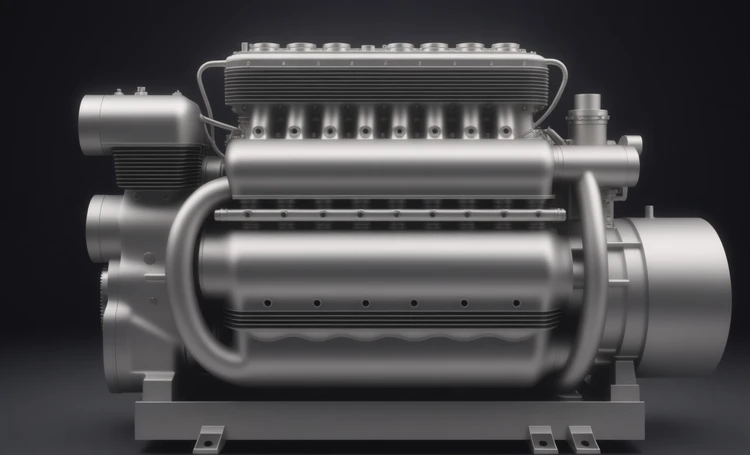🚗💡 Engine Innovation 2024: Where are we heading?
Every year the world of automotive technology becomes more innovative and amazing. In 2024, we will experience breakthroughs that previously seemed impossible. We suggest choosing accessories for a modern engine here so that your car is not only modern, but also fully in line with the latest trends.
🛠️ Improving internal combustion
Despite the rapid growth of electrification, traditional internal combustion engines (ICEs) remain relevant thanks to innovations that reduce their environmental footprint.
Fuel savings and emissions reduction
Manufacturers are investing in developing more fuel-efficient engines that can significantly reduce fuel consumption and emissions. Technologies such as variable valve timing and direct injection are becoming standard even on budget models.
Innovative materials
The use of lightweight, strong materials such as carbon fiber and aluminum alloys reduces engine weight, improves engine performance and improves overall vehicle efficiency.
⚡ Electrification: on the way to clean energy
The electrification of transportation continues to gain momentum, and 2024 will be no exception. Many automakers are announcing the entry of new all-electric models into the market.
Charging infrastructure development
To support the growing number of electric vehicles, charging infrastructure is being improved and expanded. Thanks to this, owners of electric vehicles can count on greater freedom of movement and ease of use.
Increased driving range
Modern batteries are becoming more capacious and lighter, which makes it possible to increase the range without recharging. Research into new types of batteries, such as lithium-air, promises a revolution in energy capacity and performance.
🌐 Autonomous technologies and AI
Modern cars already have a certain level of autonomy, but the future promises even more options for drivers and passengers.
Driver assistance systems
Advanced driver assistance systems (ADAS) are becoming increasingly intelligent, capable of preventing accidents and ensuring a high level of road safety.
Fully autonomous driving
Although fully autonomous cars have not yet become an everyday reality, progress in this area is inevitable. Developments in the field of artificial intelligence and machine learning promise that in the near future, cars will be able to move completely independently on the roads.
Application of innovations in practice
Innovation in propulsion technology is not limited to laboratory research; they find their application in everyday life. For example, many companies are introducing hybrid technologies, combining internal combustion engines with electric motors to provide cleaner and more efficient vehicle operation. These technologies make cars not only more environmentally friendly, but also more powerful and technologically advanced.
Smart engine management systems
Every year, electronics are becoming deeper and deeper into automotive systems. Smart engine management systems are able to optimize engine performance in real time, taking into account many parameters – from driving style to external weather conditions.
Hybridization and modularity
Hybrid systems, which combine multiple energy sources, are becoming increasingly modular, allowing drivers to choose the optimal engine operating mode. This not only improves efficiency, but also allows for better adaptation to different operating conditions.
Alternative fuels and energy solutions
In search of an alternative to oil, scientists and engineers are developing engines that can run on biofuels, compressed natural gas (CNG) and even hydrogen. These innovations promise to make the auto industry more sustainable and less dependent on fossil fuels.
Changes in legislation and standards
With tightening environmental requirements in different countries, car manufacturers are forced to adapt to new realities. Engine innovation not only meets these demands, but often goes beyond them, offering solutions that make cars cleaner and safer not only for the environment, but also for the users themselves.
Tightening environmental standards
Countries around the world are introducing increasingly stringent emissions standards for cars. This leads to the need to review and improve propulsion technologies to meet new requirements and avoid penalties.
Innovation as a response to legislative changes
Automotive manufacturers invest heavily in research and development to ensure their products not only meet but exceed environmental regulations. This stimulates the development of new, cleaner and more efficient engines.
Social responsibility and public perception
In the modern world, consumers are increasingly choosing products and services that protect sustainable development. Automotive brands that offer innovative and environmentally friendly engines gain customer loyalty and create a positive image in society.
Consumer Awareness
With increasing environmental awareness among consumers, the demand for low-emission and high-fuel-efficient vehicles is increasing. Engine innovations are allowing manufacturers to meet this demand.
Automotive companies are looking not only to increase sales, but also to strengthen their status as responsible social actors. Developing clean engine technologies is one way to demonstrate this responsibility.
Table: Comparison of efficiency of different types of engines
| engine's type | Fuel efficiency | Emission level | Cost of ownership |
|---|---|---|---|
| ICE | Average | High | Low |
| Hybrid | High | Average | Average |
| Electric | Very high | Null | High |
| Hydrogen | High | Null | While high |
Innovation illustration
Images showcasing cutting-edge designs and concept vehicles can be used to visualize progress in propulsion technology. This helps readers better understand exactly how new technologies look and work.
” Innovation in automotive and propulsion technologies is not only the path to reducing emissions, but also to creating smarter, safer and more enjoyable cars.” — Ivan Ivanov, automotive industry expert.
Impact on the cost of car ownership
Innovations in propulsion technology have a significant impact on the cost of car ownership. While the initial cost of a vehicle may increase due to expensive technology, overall fuel and maintenance costs over the life of the vehicle can be significantly reduced.
Reduced fuel costs
Modern engines, especially hybrid and electric ones, provide greater fuel efficiency, which leads to lower fuel costs – a significant cost for a car owner.
Reduced maintenance costs
Thanks to improvements in engine design, as well as the use of quality materials and components, modern cars require less maintenance, which also reduces overall costs for owners.
Conclusion and results
In conclusion, it is safe to say that innovation in propulsion technology plays a key role in shaping the future of the automotive industry. Not only do they improve environmental performance and reduce ownership costs, but they also open up new horizons for the development of cars that are even smarter, safer and easier to use.
To sum up, it becomes obvious that propulsion technology in 2024 will be completely different than it is today. Manufacturers, consumers and governments around the world recognize the need for change, and the technological advances we are now witnessing are testament to this global effort. Research and innovation will continue to drive the industry forward, and the cars of the future will be more efficient, cleaner and more fun to drive than ever before.


